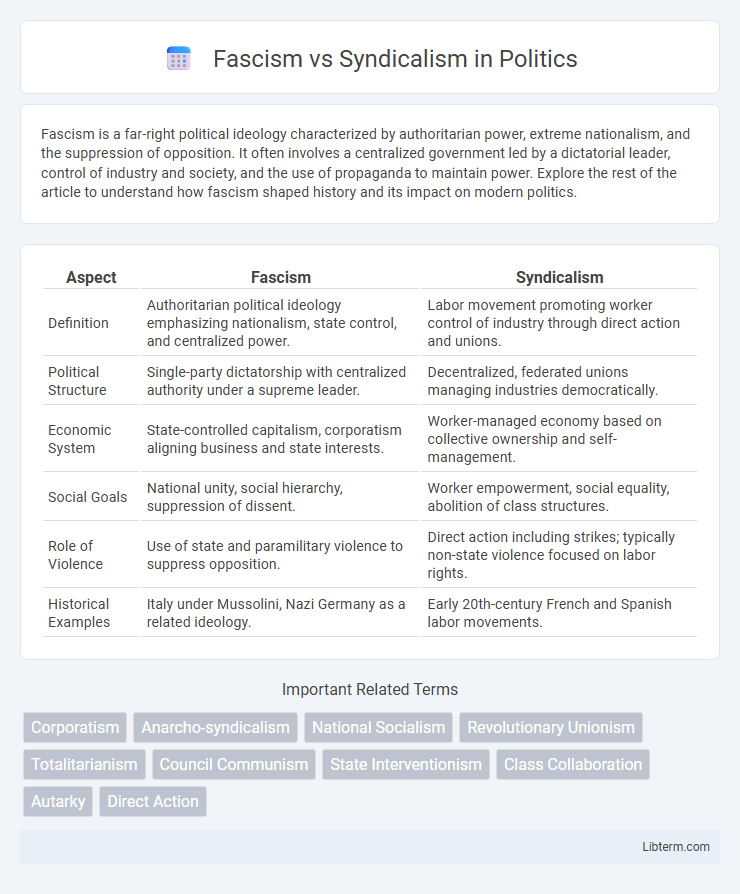Fascism is a far-right political ideology characterized by authoritarian power, extreme nationalism, and the suppression of opposition. It often involves a centralized government led by a dictatorial leader, control of industry and society, and the use of propaganda to maintain power. Explore the rest of the article to understand how fascism shaped history and its impact on modern politics.
Table of Comparison
| Aspect | Fascism | Syndicalism |
|---|---|---|
| Definition | Authoritarian political ideology emphasizing nationalism, state control, and centralized power. | Labor movement promoting worker control of industry through direct action and unions. |
| Political Structure | Single-party dictatorship with centralized authority under a supreme leader. | Decentralized, federated unions managing industries democratically. |
| Economic System | State-controlled capitalism, corporatism aligning business and state interests. | Worker-managed economy based on collective ownership and self-management. |
| Social Goals | National unity, social hierarchy, suppression of dissent. | Worker empowerment, social equality, abolition of class structures. |
| Role of Violence | Use of state and paramilitary violence to suppress opposition. | Direct action including strikes; typically non-state violence focused on labor rights. |
| Historical Examples | Italy under Mussolini, Nazi Germany as a related ideology. | Early 20th-century French and Spanish labor movements. |
Origins of Fascism and Syndicalism
Fascism originated in early 20th-century Italy as a reaction to post-World War I economic instability and social unrest, rooted in nationalist and authoritarian ideologies led by Benito Mussolini. Syndicalism emerged in the late 19th and early 20th centuries, primarily in France, as a labor movement advocating direct worker control of industries through trade unions and revolutionary means. Both ideologies arose from responses to industrial capitalism but diverged sharply in their approach to state power and class struggle.
Core Ideological Differences
Fascism centers on authoritarian nationalism, emphasizing a centralized state, hierarchical leadership, and often a single-party system to enforce unity and control. Syndicalism prioritizes workers' self-management through decentralized, direct control of industries by labor unions, aiming for a classless society with collective ownership. The core ideological divide lies in Fascism's top-down approach to power versus Syndicalism's bottom-up emphasis on worker autonomy and democratic governance.
Political Structure and Leadership
Fascism emphasizes a centralized, authoritarian political structure led by a single, dominant leader who embodies national unity and exercises absolute control over the state apparatus. Syndicalism advocates for decentralized governance through worker-controlled unions and councils, promoting direct democracy and collective leadership rather than hierarchical authority. The fundamental contrast lies in Fascism's top-down command model versus Syndicalism's bottom-up, participatory approach to political organization and leadership.
Economic Models and Class Relations
Fascism promotes a corporatist economic model where the state controls and harmonizes relations between employers and employees, suppressing class conflict by subordinating individual and class interests to national unity. Syndicalism advocates for direct worker control of industries through trade unions or syndicates, emphasizing the abolition of capitalist ownership and class hierarchies in favor of cooperative self-management. The fascist model seeks to maintain existing class structures under state supervision, while syndicalism aims for a radical restructuring of economic power rooted in the working class.
Attitudes Toward Individual Freedoms
Fascism prioritizes state control and collective identity, often suppressing individual freedoms to maintain national unity and authoritarian power. Syndicalism emphasizes worker control and direct participation in economic and political decision-making, promoting greater individual autonomy within collective labor organizations. Both ideologies critique liberal individualism but diverge in their approaches to balancing personal liberty with social order.
Role of the State in Society
Fascism advocates for a powerful, centralized state that controls society and the economy to maintain national unity and suppress dissent, prioritizing collective identity over individual rights. Syndicalism promotes a decentralized approach where worker-managed syndicates govern economic and social affairs, minimizing state intervention to empower labor and grassroots democracy. The role of the state in fascism is authoritative and coercive, while in syndicalism it is largely diminished or absent, replaced by direct worker control.
Nationalism vs. Internationalism
Fascism is characterized by intense nationalism, emphasizing the supremacy of the nation-state and promoting unity through centralized authoritarian control. Syndicalism advocates internationalism, seeking solidarity among workers across borders to achieve economic and social reform through collective labor movements. The nationalist focus of Fascism contrasts sharply with Syndicalism's goal of transcending national boundaries for global worker cooperation.
Historical Examples and Case Studies
Fascism, exemplified by Mussolini's Italy and Hitler's Nazi Germany, centralized authoritarian control, promoting nationalistic and militaristic agendas while suppressing labor unions and socialist movements. Syndicalism, as seen in early 20th-century France and Spain, emphasized direct worker control of industries through trade unions and revolutionary action, striving to replace capitalism with a federated system of labor councils. The Spanish Civil War illustrated the conflict, where anarcho-syndicalist groups like the CNT opposed both fascist forces and traditional state structures, highlighting the ideological and strategic divergences between fascism and syndicalism.
Influence on Modern Political Movements
Fascism's influence on modern political movements is evident in the rise of authoritarian nationalism and centralized state control, shaping far-right groups worldwide. Syndicalism has impacted labor movements and left-wing activism by promoting decentralized worker control and direct action, inspiring contemporary unions and cooperative enterprises. Both ideologies continue to affect debates on governance, social organization, and economic power distribution in modern political discourse.
Lasting Legacies and Contemporary Relevance
Fascism's lasting legacy includes authoritarian nationalism, centralized state control, and suppression of dissent, which influenced totalitarian regimes in the 20th century and digital authoritarianism today. Syndicalism's impact endures through labor union movements, workplace democracy, and cooperative economics, shaping contemporary discussions on workers' rights and participatory management. Both ideologies inform modern political debates on state power, economic organization, and collective action across various global contexts.
Fascism Infographic

 libterm.com
libterm.com